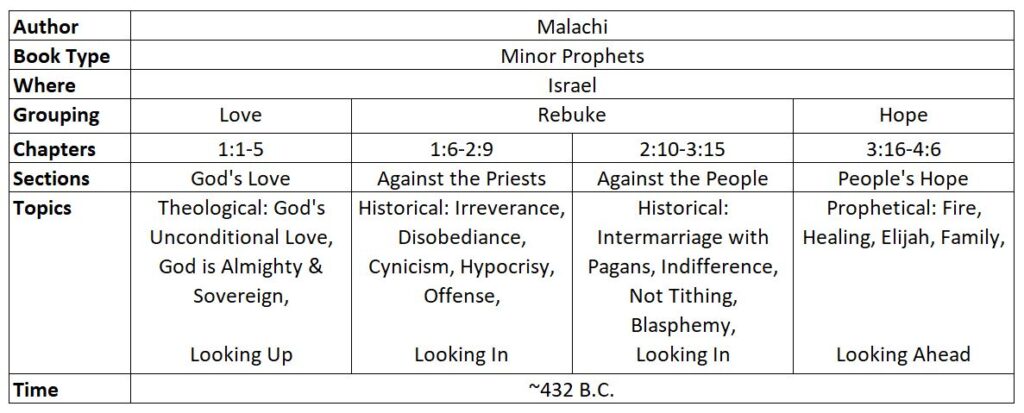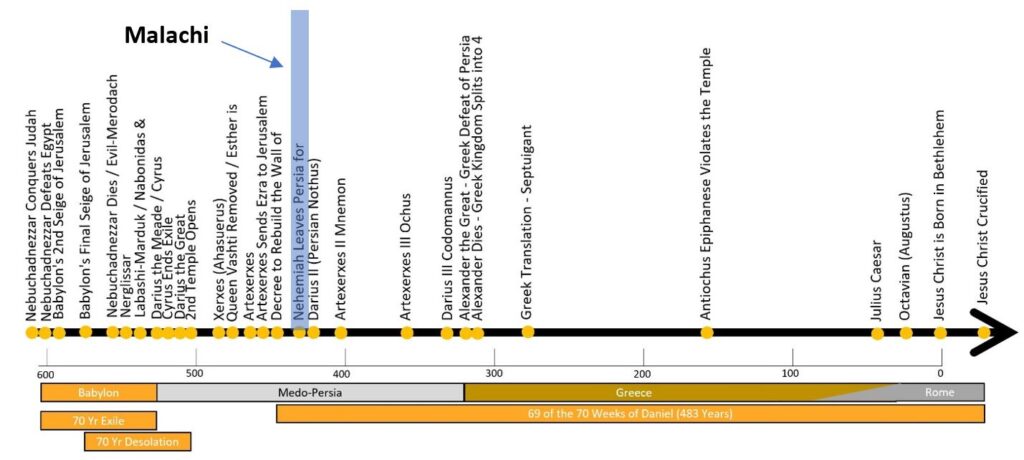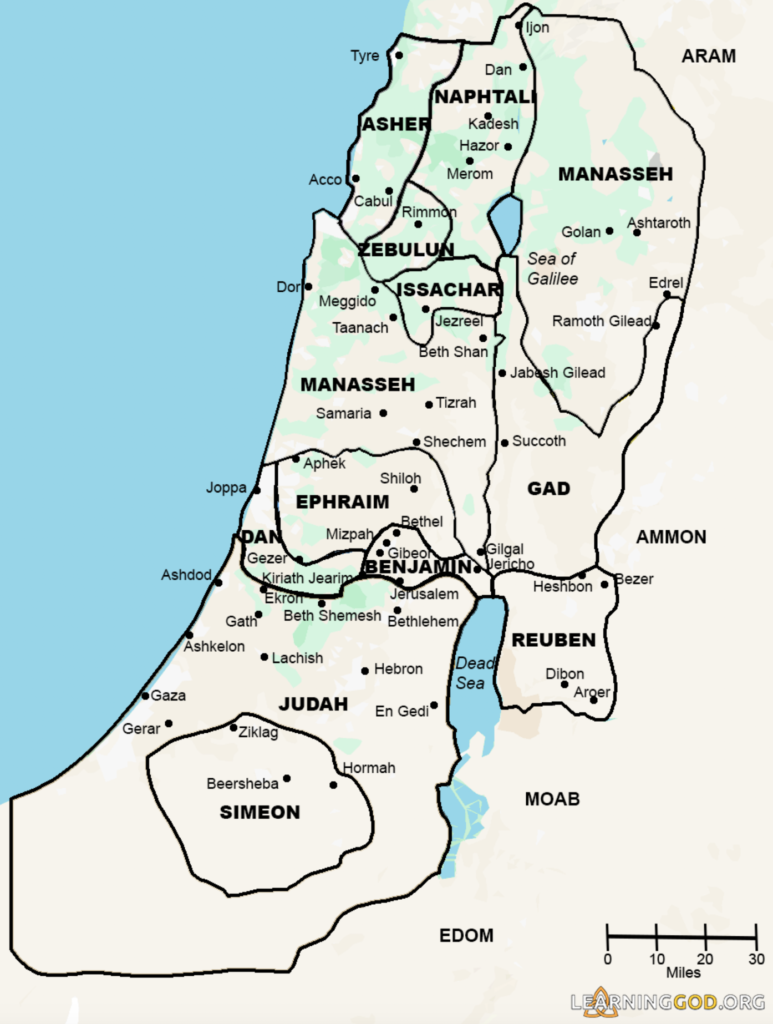Malachi
A Call to Faithfulness
Summary | About | Why You Should Read it | Author | When Written | Context | Timeline | Location | Outline | Observations | Resources
Summary
The book of Malachi is the last book of the Old Testament and serves as a prophetic message to the people of Israel. It is written by the prophet Malachi, whose name means “my messenger.” The book, set during the post-exilic period after the Israelites had returned from Babylonian captivity, addresses spiritual complacency and religious corruption.
Here’s a high-level summary:
- Accusation of Unfaithfulness: Malachi opens with God reminding Israel of His love, but the people are accused of dishonoring Him. The priests, in particular, are criticized for offering impure sacrifices and neglecting their duties, leading to a decline in religious devotion.
- Social and Moral Failures: The people are accused of breaking covenants, including unfaithfulness in marriage and widespread social injustice. Divorce and idolatry are called out, with God warning against their disregard for His laws.
- Promise of Judgment and Restoration: God promises that a day of judgment is coming, often referred to as the “Day of the Lord,” where the wicked will be judged, but the faithful will be rewarded. There is also a promise of a coming messenger who will prepare the way for the Lord, a prophecy later associated with John the Baptist and the coming of Jesus Christ.
- Call to Repentance: Malachi urges the people to return to God, particularly through faithfulness in tithing and worship. The lack of proper tithing is seen as robbing God, and the people are called to test God’s faithfulness by returning to Him.
- Hope for the Future: Despite the people’s shortcomings, Malachi ends with a promise of hope. God will send the prophet Elijah (interpreted in the New Testament as John the Baptist) before the great and dreadful Day of the Lord to restore righteousness and prepare the people for the coming of the Messiah.
The overarching themes in Malachi are covenant faithfulness, the coming judgment, and the future promise of salvation for those who fear God.
The following table provides a high-level look at the structure and contents of the book of Malachi.

About
Malachi is the 39th book of the Bible and the 12th of the book of the Minor Prophets of the Old Testament.

Why You Should Read It
Reading the book of Malachi can offer valuable spiritual insights and practical lessons, regardless of your background or beliefs. Here are several reasons why it might be meaningful to you:
- Self-Reflection on Faithfulness
Malachi calls people to examine their relationship with God and the sincerity of their worship. It encourages you to reflect on how genuine your own commitment is in your spiritual life, whether you’re doing things out of habit or from a heart of devotion.
- Challenges to Hypocrisy
It confronts religious hypocrisy, especially among leaders, and challenges those who may be going through the motions without truly honoring their values or faith. This can resonate with anyone who feels disillusioned by institutions or leaders who fail to live up to their responsibilities.
- Timeless Social and Moral Lessons
The book touches on issues like justice, integrity in relationships (like marriage), and fairness—principles that are still relevant today. Malachi highlights the consequences of neglecting these areas in both personal and communal life.
- Encouragement for Spiritual Renewal
Malachi calls for renewal through repentance, urging people to return to God with sincerity. Whether you’re looking to reinvigorate your faith or are just searching for deeper meaning, it offers a pathway to reconnect with your values and spiritual practices.
- Hope and Expectation
The book ends with a message of hope, pointing to a future of restoration and the coming of the Messiah. This promise of redemption can inspire readers with the hope that change is possible and that faithfulness will be rewarded, even after periods of doubt or disobedience.
- Understanding Prophecy and New Testament Connections
For those interested in the Bible’s broader narrative, Malachi serves as a bridge between the Old Testament and the New Testament. Its prophecies about the coming of Elijah (often linked to John the Baptist) and the Messiah directly connect with the ministry of Jesus Christ in the Gospels, deepening your understanding of biblical prophecy and fulfillment.
- Cultural and Religious Insight
Even from a non-religious perspective, reading Malachi offers a glimpse into the challenges of a community striving to remain faithful after a period of exile, dealing with real-world issues like leadership failure, social justice, and religious decay. It can provide insights into how ancient cultures navigated these issues, which have parallels in modern times.
In short, reading Malachi can help you explore themes of renewal, accountability, justice, and hope—things that resonate in both personal and societal contexts.
Author
The author of the book of Malachi is traditionally identified as the prophet Malachi, though there is some debate among scholars about whether “Malachi” is a personal name or a title. The name Malachi means “my messenger” or “messenger of Yahweh” in Hebrew, leading some to suggest that the book could have been written by an unnamed prophet who simply identified himself as a “messenger.”
However, based on tradition and the structure of the book, it is commonly accepted that Malachi was a specific prophet, though little is known about him beyond this book. Unlike some other prophets, there is no biographical information or narrative about his life in the Bible. The focus is entirely on the message itself rather than the person delivering it.
When Written
The book of Malachi was written in the post-exilic period, likely around 450-400 B.C.
Context
The book of Malachi was written after the Jewish people had returned from Babylonian exile and were resettling in their homeland, particularly in Jerusalem. The following context is important for understanding the book:
- Post-Exilic Period
The Jewish people had been in exile in Babylon for about 70 years (beginning in 586 B.C. when Jerusalem was destroyed). When the Persian Empire, led by King Cyrus, conquered Babylon, he allowed the Jews to return to their homeland and rebuild their temple and city (as recorded in the books of Ezra and Nehemiah).
By the time Malachi was written, the temple had been rebuilt (around 516 B.C.), and worship had been restored. However, this period was one of spiritual stagnation and disappointment. The people’s expectations for a glorious restoration (as foretold by earlier prophets) had not fully materialized, leading to disillusionment.
- Spiritual and Moral Decline
Although the people were back in their land and had restored temple worship, their spiritual fervor had waned. Priests and the general population were falling into a routine of formalized, insincere worship, and the society was marked by moral and ethical failures.
The priests, in particular, were offering blemished sacrifices, violating God’s standards for proper worship. This revealed a deeper problem of disrespect for God and a lack of reverence for the covenant.
- Social and Economic Hardships
The community was facing ongoing social and economic difficulties. The Persian Empire still ruled over Israel, so the nation did not experience the independence and political restoration that many had hoped for. Economic struggles, coupled with corruption among priests and leaders, further weakened the society.
Issues such as unfaithfulness in marriage, divorce, injustice, and neglect of the poor were prevalent, and these societal issues were signs of the people’s deeper spiritual neglect.
- Expectation of the Messianic Age
In this time of moral decline and disappointment, the people were still waiting for the fulfillment of the messianic prophecies. Prophets like Isaiah and Jeremiah had spoken of a coming age of peace and prosperity under a Davidic king, but this had not yet come to pass.
The hope for God’s intervention and the arrival of a future messenger who would prepare the way for the Lord (as prophesied in Malachi) was a key expectation. This messenger would restore true worship and bring about divine justice.
- Covenant Relationship with God
Central to the book is the covenant between God and Israel. Malachi, like other prophets, called the people back to faithfulness to the covenant established through Moses. He reminded them that their actions—whether in worship, social justice, or personal relationships—were not just moral choices but reflections of their covenant relationship with God.
The lack of faithfulness in following the laws of Moses (e.g., improper sacrifices, failure to tithe, and social injustices) was seen as a breach of this covenant, and Malachi warned that divine judgment was imminent if they did not return to God.
- Religious Leadership’s Corruption
The book specifically addresses the priests, who were responsible for leading the people in worship but had become corrupt and complacent. Their failure to uphold the standards of proper sacrifices and reverence for God was contributing to the overall decline of faith in Israel.
Malachi’s message held the religious leaders accountable for their role in the people’s spiritual state and called for reform.
- Preparation for Future Prophetic Fulfillment
The final chapters of Malachi contain prophecies concerning the future: a messenger who would come to prepare the way for the Lord (interpreted in the New Testament as John the Baptist) and the coming “Day of the Lord,” a time of judgment and purification.
This sets the stage for the New Testament, linking Malachi with the coming of Jesus Christ and the fulfillment of messianic expectations.
In summary, Malachi was written in a context of spiritual complacency, moral decline, and unmet expectations. The Jewish people, having returned from exile, were struggling to maintain their faith in God amidst difficult circumstances, while also dealing with religious corruption and social injustice. Malachi’s message was a call to repentance, reform, and hope in God’s future intervention through the coming of a promised messenger.
Timeline
The timeline below shows from the time of the Exile through the time of Jesus Christ. Malachi was contemporary with Nehemiah. The events of Malachi take place in approximately 432 B.C.
Location
Malachi is a prophecy to all of Israel and was written in Israel.
Outline
| I. Title (1:1) |
| II. Introduction: God’s Faithful Covenant Love for Israel Affirmed (1:2-5) |
| III. Israel’s Unfaithfulness Rebuked (1:6;2:16) |
| A. The Unfaithfulness of the Priests (1:6;2:9) |
| 1. They dishonor God in their sacrifices (1:6-14) |
| 2. They do not faithfully teach the law (2:1-9) |
| B. The Unfaithfulness of the People (2:10-16) |
| IV. The Lord’s Coming Announced (2:17;4:6) |
| A. The Lord Will Come to Purify the Priests &Judge the People (2:17;3:5) |
| B. A Call to Repentance in View of the Lord’s Coming (3:6-18) |
| 1. An exhortation to faithful giving (3:6-12) |
| 2. An exhortation to faithful service (3:13-18) |
| C. The Day of the Lord Announced (ch. 4) |
Observations
- The only Old Testament mention of Malachi is in Malachi 1:1.
- Malachi was a prophet during the time of Nehemiah.
- Malachi directs his message to people who are:
- Plagued with corrupt priests.
- Plagued with wicked practices.
- Have a false sense of security regarding their privileged relationship with God.
- Malachi uses the question-and-answer method to probe into the problems of:
- Hypocrisy
- Infidelity
- Mixed marriages
- Divorce
- False worship
- Arrogance
- The people have become so sinful that messages sent from God no longer have any impact.
- The Book of Malachi is a prelude to the 400 years of prophetic silence broken finally by the words of the next prophet, John the Baptist.
- Malachi 3:1 – “Behold, I send My messenger, And he will prepare the way before Me. And the Lord, whom you seek, Will suddenly come to His temple, Even the Messenger of the covenant, in whom you delight. Behold, He is coming, “Says the LORD of hosts.”
- Matthew 3:3 – “. . . Prepare the way of the Lord; Make His paths straight.
- John 1:29 – “. . . Behold! The Lamb of God who takes away the sin of the world!
- Malachi ends on the bitter word “Curse” (3:14).
Old Testament
New Testament
Free Resources
Other Resources
- x


